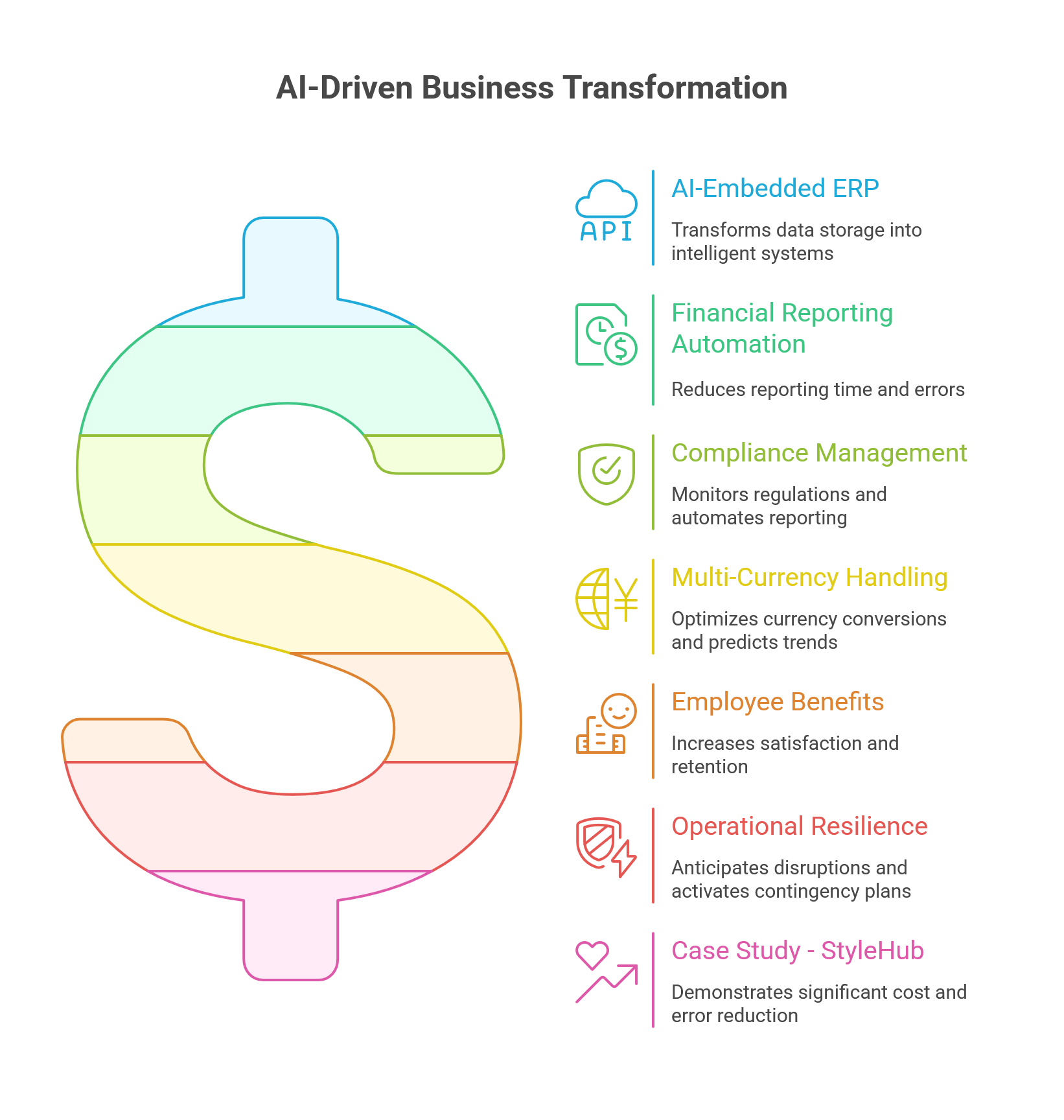Summary
AI is revolutionising retail workflows, especially for South African retailers, by transforming traditional ERP systems into intelligent, proactive platforms. These AI-embedded systems automate complex tasks like financial reporting, compliance, multi-currency management, and supply chain resilience, drastically reducing errors and manual work.
This shift boosts operational efficiency and profitability and enhances employee satisfaction by freeing staff from repetitive tasks to focus on strategic, creative roles. Real-world examples, such as the Cape Town-based StyleHub, demonstrate significant cost savings, improved accuracy, and better customer service through AI adoption.
Key Points
- AI-Embedded ERP: Transforms traditional data storage into intelligent systems that learn, predict, and act, enabling smarter decision-making and operational adaptability.
- Financial Reporting Automation: Cuts reporting time drastically (e.g., 5 days to 2 hours), reduces errors by 95%, provides real-time dashboards, and automates multi-currency reconciliation.
- Compliance Management: AI monitors regulations like POPIA and SARS continuously, automating compliance reporting and avoiding costly fines.
- Multi-Currency Handling: AI optimises currency conversions instantly across 180+ currencies, predicts exchange rate trends, and saves significant costs.
- Employee Benefits: Automation reduces repetitive tasks, leading to a 59% increase in employee satisfaction and improved retention.
- Operational Resilience: AI anticipates disruptions (e.g., supply chain issues) and activates contingency plans automatically, increasing recovery speed by 40%.
- Case Study - StyleHub: Achieved 35% cost reduction, 90% error reduction, 67% lower employee turnover, and 28% higher customer satisfaction within 18 months of AI implementation.

AI-driven retail operations are no longer a future vision but a current competitive necessity, enabling smarter, more agile business practises.
How AI Revolutionises Retail Workflows Beyond Basic Automation
Remember when your retail team spent hours on tedious financial reports and compliance paperwork? Those days are rapidly disappearing.
AI-embedded ERP systems are completely transforming how South African retailers operate. These intelligent platforms don’t just digitise your existing processes, they reimagine them entirely. Think of it as upgrading from a bicycle to a Tesla.
Here’s what’s happening in the real world: retailers using AI automation are cutting manual errors by 90% while freeing up staff for strategic work that actually grows the business. Instead of drowning in spreadsheets, your team can focus on customer relationships and growth initiatives.
The magic lies in how these systems handle complex tasks automatically. Multi-currency transactions that once required hours of manual calculations now process in seconds. Compliance reporting that used to stress your finance team happens seamlessly in the background.
South African retailers from Cape Town to Johannesburg are discovering that AI doesn’t replace human creativity, it amplifies it. When machines handle the mundane tasks, your people shine in roles that require critical thinking and relationship building.
This isn’t just about efficiency; it’s about building future-ready operations that adapt and thrive in an increasingly complex retail landscape.
The Power of AI-Embedded ERP in Modern Retail Operations
Your old ERP system was like having a really good filing cabinet, organised, but not particularly smart. AI-embedded ERP? That’s like having a brilliant business partner who never sleeps.
Here’s the reality: traditional ERP systems store your data beautifully, but they can’t think about it. AI-embedded solutions don’t just store, they learn, predict, and act. These intelligent platforms analyse your sales patterns, spot trends before you notice them, and automate decisions that used to keep you up at night.
South African retailers are seeing game-changing results. One Cape Town fashion chain reduced their monthly reporting time from 5 days to 2 hours. Not 5 hours, 2 hours. Their AI system now handles everything from inventory calculations to profit margin analysis automatically.
The difference is like comparing a calculator to a financial advisor. Traditional ERP tells you what happened; AI-embedded ERP tells you what’s happening, what’s likely to happen next, and what you should do about it.
These systems don’t just process faster, they think smarter. They recognise when customer buying patterns shift, predict inventory needs before stockouts occur, and flag unusual transactions that might indicate problems. It’s operational intelligence that adapts and improves with every transaction.
Financial Reporting Automation That Actually Works
Picture this: it’s month-end, and instead of your finance team pulling all-nighters with spreadsheets, they’re sipping coffee while AI generates perfect reports automatically.
AI-embedded financial reporting transforms the nightmare of manual data compilation into a seamless, error-free process. These systems don’t just crunch numbers, they understand them. They automatically reconcile accounts, handle complex multi-currency calculations, and ensure every rand is accounted for with mathematical precision.
South African retailers using automated reporting see 95% fewer errors and complete monthly closings 80% faster. One Johannesburg electronics retailer went from 12-day month-end processes to same-day closings. Their CFO now receives real-time dashboards showing exactly where the business stands at any moment.
The magic happens behind the scenes. While you focus on growing your business, AI handles the tedious work of data validation, currency conversions, and regulatory formatting. It even learns your reporting preferences and customises outputs to match your exact needs.
Key benefits include:
- Real-time profit and loss visibility
- Instant cash flow analysis
- Automated SARS-compliant reporting
- Custom dashboard creation for different stakeholders
- Integration with existing banking and payment systems
Compliance Management Without the Headaches
Remember when POPIA regulations launched and everyone panicked about compliance? AI-embedded systems turn regulatory nightmares into automated routines.
These intelligent platforms monitor regulatory changes 24/7, automatically updating your processes when new requirements emerge. They track data usage, generate required reports, and flag potential compliance issues before they become costly problems. Think of it as having a compliance expert who never takes a day off.
South African retailers face complex regulatory landscapes, from SARS tax requirements to POPIA data protection and industry-specific regulations. AI systems handle this complexity seamlessly, ensuring you’re always compliant without constant manual oversight.
One Kwazulu-Natal grocery chain saved R2.3 million in potential POPIA fines by implementing AI compliance monitoring. The system automatically flagged data handling inconsistencies and corrected them before regulators noticed.
Automated compliance features:
- Real-time POPIA data tracking and reporting
- Automatic SARS submission formatting and scheduling
- Risk assessment with early warning alerts
- Audit trail generation for regulatory reviews
- Penalty avoidance through proactive monitoring
The peace of mind is invaluable. Instead of worrying about missed deadlines or forgotten requirements, you can focus on growing your business while AI ensures you stay on the right side of every regulation.
Multi-Currency Mastery for South African Retail Success
Ever tried calculating exchange rates for multiple suppliers while your accountant is breathing down your neck about quarterly reports? It’s like juggling flaming torches while riding a unicycle.
South African retailers dealing with international suppliers know this pain intimately. One day, the rand strengthens against the dollar, the next it weakens against the euro. Meanwhile, you’re trying to figure out if that shipment from China just became more expensive or if your European supplier’s invoice needs adjustment.
AI-embedded ERP systems turn this chaos into child’s play. These intelligent platforms monitor currency markets constantly, automatically adjusting your records as exchange rates shift. No more manual calculations, no more costly errors, and definitely no more sleepless nights wondering if you’ve priced everything correctly.
A Durban-based electronics retailer recently shared how their AI system saved them, R850,000 in a single quarter by optimising currency conversions. The system spotted favourable exchange windows and automatically executed transactions at the best possible rates, something their finance team could never manage manually.
The system handles:
- Instant currency conversions across 180+ currencies
- Real-time rate monitoring and alerts
- Automated hedging recommendations
- Risk assessment for international purchases
Real-Time Exchange Rate Intelligence
Your AI system never blinks. While you’re sleeping, it’s watching global currency markets, analysing patterns, and preparing strategies for the next business day.
These intelligent platforms don’t just track current rates, they predict where currencies are heading. Think of it as having a crystal ball for foreign exchange markets. The AI analyses economic indicators, political events, and market sentiment to forecast currency movements with impressive accuracy.
One Cape Town fashion retailer using predictive currency analytics increased their profit margins by 12% simply by timing their international purchases better. The AI warned them about an upcoming rand weakness three days before it happened, allowing them to lock in favourable rates.
Key intelligence features:
- Predictive analytics for 48-hour currency forecasting
- Automated alerts for favourable conversion opportunities
- Historical trend analysis for strategic planning
- Risk scoring for international transactions
Seamless Cross-Border Transaction Processing
Remember the last time you processed an international payment? The forms, the compliance checks, the bank fees, the waiting, the wondering if everything went through correctly?
AI automation transforms this nightmare into a smooth, one-click process. The system handles all documentation automatically, ensures compliance with international regulations, and optimises settlement routes to minimise fees.
A Johannesburg jewellery retailer reduced their international transaction costs by 40% after implementing AI-powered payment processing. The system automatically routes payments through the most cost-effective channels and handles all regulatory paperwork behind the scenes.
Automated processing includes:
- Instant compliance verification across jurisdictions
- Smart routing for lowest transaction fees
- Automatic documentation generation
- Real-time settlement tracking and notifications
The peace of mind is incredible. Instead of worrying about whether your international payments will clear properly, you can focus on growing your global supplier relationships while AI handles all the complex details flawlessly.
Employee Satisfaction: The Hidden Benefit of AI Automation
Here’s something most business owners don’t expect: implementing AI automation actually makes employees happier, not more worried about job security.
When AI handles the boring stuff, endless data entry, repetitive calculations, compliance paperwork, your team finally gets to do what they’re actually good at. Customer problem-solving. Strategic thinking. Creative work that makes them feel valued.
South African retailers are seeing remarkable results. Employee satisfaction jumps by 59% on average after AI implementation. Why? Because nobody enjoys spending hours copying numbers between spreadsheets when they could be helping customers or developing new ideas.
A Johannesburg home goods store discovered their staff retention improved dramatically after introducing AI automation. Instead of losing talented people to tedious tasks, employees now focus on merchandising, customer relationships, and process improvements. One team member said it best: “I finally feel like I’m using my brain again instead of being a human calculator.”
AI transforms work by:
- Eliminating mind-numbing repetitive tasks
- Creating time for strategic thinking and creativity
- Enabling skill development in meaningful areas
- Improving work-life balance through efficiency gains
The ripple effects are incredible. When employees feel engaged and challenged, customer service improves. When staff aren’t exhausted by manual processes, they bring fresh energy to problem-solving. It’s a win-win scenario that many retailers discover accidentally.
Building Operational Resilience Through Intelligent Automation
Remember when load-shedding caught everyone off guard? Resilient businesses bounced back fast because their AI systems had backup plans ready to go.
AI-embedded systems don’t just automate, they anticipate. These intelligent platforms constantly monitor your operations, spot potential problems before they explode, and automatically implement solutions when disruptions hit. It’s like having a crisis management expert who never sleeps.
South African retailers using AI resilience strategies recover from disruptions 40% faster than competitors. One Cape Town electronics chain weathered a major supplier bankruptcy without missing a beat because their AI system had already identified alternative suppliers and automatically initiated new procurement processes.
Intelligent resilience features:
- Early warning systems for supply chain issues
- Automated backup supplier activation
- Real-time market change adaptation
- Predictive risk assessment across all operations
The magic happens in preparation. While you’re focused on daily operations, AI continuously runs scenarios, updates contingency plans, and ensures your business can handle whatever challenges emerge. When concerns do hit, you’re not scrambling for solutions, you’re executing pre-planned responses.
This isn’t about preventing every concern (that’s impossible). It’s about ensuring concerns don’t paralyse your business. AI resilience means disruptions become minor speed bumps rather than roadblocks, keeping your operations smooth and your customers satisfied even when external conditions get rough.
Real-World Success: South African Retail Case Study
Meet StyleHub, a Cape Town-based fashion retailer that went from chaos to clarity in just 18 months.
Picture this: 200 stores across South Africa, each dealing with different suppliers, currencies, and compliance requirements. Monthly financial reports took two weeks to compile, errors plagued inventory management, and staff were drowning in paperwork instead of serving customers.
The transformation started with a simple question: “What if our systems could think for themselves?”
StyleHub implemented AI-embedded ERP across their entire operation. The results? Mind-blowing. Operating expenses declined by 35%, errors fell by 90%, and financial reporting that once took weeks now happens in real-time. But here’s the kicker, employee satisfaction skyrocketed because staff could finally focus on what they love: fashion and customers.
The numbers tell the story:
- Implementation completed in 18 months across all locations
- R12 million saved annually through automation efficiency
- Employee turnover reduced by 67% within the first year
- Customer satisfaction scores improved by 28%
The AI system now handles currency conversions for international suppliers automatically, manages SARS compliance without human intervention, and spots inventory discrepancies before they become problems. One store manager said it best: “I feel like I have a super-smart business partner who never takes a day off.”
The ROI was clear within 8 months. Every rand invested in AI automation returned R3.50 in operational savings and improved performance.
Wrapping Up: Your Next Steps Toward Intelligent Retail Operations
The evidence is overwhelming, AI-embedded automation isn’t just the future of retail, it’s the present competitive advantage.
South African retailers who embrace these technologies aren’t just keeping up; they’re pulling ahead. While competitors struggle with manual processes, AI-powered businesses operate with precision, adapt quickly to market changes, and create workplaces where employees thrive.
Your transformation doesn’t have to be overwhelming. Start by identifying one painful manual process, maybe monthly reporting, inventory reconciliation, or compliance management. Then explore how AI can eliminate that pain point while freeing your team for strategic work.
The businesses winning today aren’t necessarily the biggest or oldest, they’re the smartest about leveraging technology to amplify human potential.
Ready to transform your retail operations? Schedule a free consultation to discover how AI-embedded ERP can revolutionise your business and boost profitability within 90 days.
FAQ Section
Q: How much does implementing AI-embedded ERP cost for South African retailers?
A: Implementation costs vary based on business size and complexity, typically ranging from R500,000 to R2 million, with most retailers seeing ROI within 12–18 months through operational savings.
Q: Will AI automation eliminate jobs in my retail business?
A: AI automation typically redeploys rather than eliminates jobs, moving employees from manual tasks to strategic roles that add greater value and job satisfaction.
Q: How long does it take to implement AI-embedded ERP systems?
A: Most implementations take 3–6 months for full deployment, with basic functionality available within 4–6 weeks for immediate operational improvements.
Q: Can AI systems handle South African regulatory compliance automatically?
A: Yes, modern AI-embedded ERP systems include built-in SARS, POPIA, and industry-specific compliance features that update automatically with regulatory changes.
Q: What happens if the AI system makes an error in financial reporting?
A: AI systems include audit trails, error detection mechanisms, and human oversight protocols that catch and correct errors before they impact business operations.





